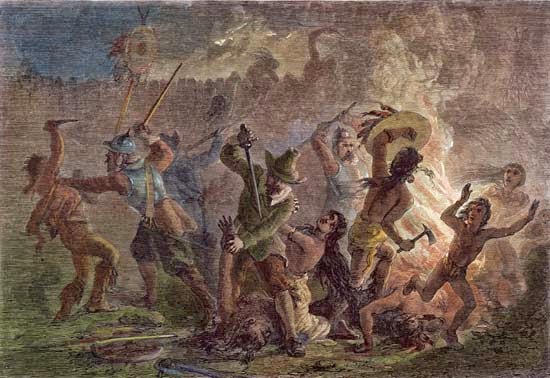-
Jean Leon Gerome Ferris (1863-1930)
Preparing to celebrate Thanksgiving, favorite U.S. holiday (for we must always be thankful for blessings), it is well for us to recall the history and myth in which it is clothed and reflect upon it.
If in 1621 "Tisquantum" or "Squanto" of the Wampanoag nation, who as a boy or youth was taken as a slave to England fifteen years before the “Pilgrims” came to America, helped the ill-provided colonists and with his tribe celebrated thanksgiving with Miles Standish and the colonists of Plymouth Plantation, it was because the Algonkian tribes were generous and held six thanks-giving festivals during the year (that one being their 5th one of the year.) They brought most of the food, including four wild turkeys, for the feasting.
But it seems that, as William B. Newell, a Penobscot Indian and former chairman of the Anthropology department at the University of Connecticut, points out, the first officially declared Thanksgiving Day by the Governor of the then Massachusetts Bay Colony was the day following the slaughtering of a Pequot village of 700 men, women, and children who were celebrating their annual Green Corn Dance, in June 1637 executed under the command of one John Underhill and documented by William Branford.
In fact, a proclamation of such a holiday recorded in Charlestown, Massachusetts, thirty-nine years later, June 20, 1676, refers to the indigenous peoples of this land as “the Enemy” in “the present Warr with the Heathen Natives of this land.” And the governing council of Charlestown, Massachusetts set June 29 to thank the god of the Puritan “pilgrims” for “giving us especially of late with many of our Confederates many signal Advantages against them [the indigenous people],” thankful “when our Enemies are in any measure disappointed or destroyed.”
It first became a national holiday declared such by George Washington in 1789 for November 26. Abraham Lincoln revived the custom in 1863, and Congress decreed the holiday should fall on the fourth Thursday of November in 1941. And so it is, a holiday with antecedents in the remotest times of human history and burdened with national myth and fact, piety and villainy more often than not inextricably intertwined.
Since 1969 or 70 on San Francisco Bay, the day is begun at sunrise with American Indian ceremony at the gathering of the tribes on the island of Alcatraz as reminder of the history of this land — and as rededication to changing its course for the better.
Feasting with family and friends in thanks for the blessings of life, Thanksgiving is a holiday of celebration whose joy is marred by a consciousness of our nation in continual war and destruction of the Earth. The government (we, if we tolerate it) not only wages war unjustly, unlawfully, justifying itself through lies and deceit, but violates the U. S. Constitution and Bill of Rights so that our civil rights and liberties are less and less guaranteed. The wealth of the nation is concentrated in the hands of the one per cent rich and powerful, and most of our people will celebrate this day with less wealth, less security, less freedom, less learning, than thirty-four years ago. And the struggle to create a democracy continues.
In the midst of this pain and exasperation, we must give thanks for the gifts of life and the sustenance of the great Mother the Earth. And for each other, and all our relations the other animals, the plants, the minerals. We give thanks mindful that in our gratitude we must also raise our voices in the name of justice and peace resolved to make amends and undertake healing knowing that gratitude for that which we enjoy at the expense and suffering of our brothers and sisters is blasphemous and unacceptable.
© Rafael Jesús González 2015
Alta California



No comments:
Post a Comment